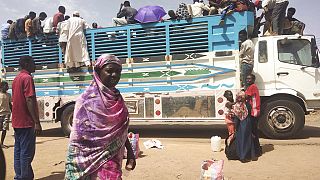The Morning Call
A Malian innovator is helping illiterate entrepreneurs to reach more customers using an audio-based social media application.
Ada Tembeli is amongst a growing number of entrepreneurs who are illiterate but now found a novel way to do business through social media. It’s called the Lenali vocal app.
Tembeli attracts customers by sending a voiced message in Bambara with her stall’s location, as well as photographs of the fruits and vegetables she has available on the day.
“Here are your lovely fruits. We have nice ripe oranges, apples, bananas. Without forgetting to mention the pineapples. Today we have almost everything to keep you satisfied. To find us go to the third bridge and you will see me,” Tembeli says, then she sends the voice message.
She said the app works for her because she didn’t go to school and doesn’t understand French – which is used across business platforms in francophone West Africa. Tembeli also said her earnings have tripled since she starting using the app, which just like Facebook, provides users options such as ‘likes’ and ‘posts’. Its interface is available in different local languages.
Lenali was developed by Mamadou Gouro Sidibe, an IT engineer from Mali.
Sidibe got the idea to create the app when the manager of a shop he regularly visits asked him to read a message in French on the chat application Viber.
Sidibe took years to develop the app. He left his career in French start-ups to work on what he says is the world’s only voice-based network available in different West African languages such as Bambara and Soninke that are spoken in Mali.
He said he wanted to create an application that could be used by people who could not read or write, as well as help those who need to share information in French but haven’t gone to school to learn it.
“I decided Lenali should be a vocal social media app, in the local language. So, because I needed to allow people like him (shop manager) to understand what they were doing when they try and install it,” he explained.
“Right up to doing up your profile vocally. If you know how to write you can put it in writing and if not you speak into the application and record it. And after that you can publish vocally, you can comment vocally and really you can do everything in this application without ever having to write a single word,” he added.
Before the application, most small business owners in Mali relied on friends, family and word of mouth to keep them going.
Now they can reach out further afield and attract a wider net of customers through the vocal app and sharing network.
Motorbike sales at Boubacar Sidiki Goita’s shop in Bamako went up by 5% this year after he started using a vocal social media application to promote his goods and share information with customers who can’t read.
Goita is literate but many of the people he is trying to reach are not.
He says Lenali has become popular with young people.
“Since I have been using Lenali, my turnover has gone up 5% and now I can sell 20 motorbikes a day whereas before it was hard work selling just 5 a day.”
Only 33% of Malians are literate, according to the United Nations.
The free app, available since January 2017, has 73,500 users, Sidibe said, and is expected to become profitable when it reaches 200,000 users.





![Africanews celebrates fifth anniversary [Night Shift]](https://static.euronews.com/articles/stories/05/57/72/74/320x180_cmsv2_6b1e7837-a917-526b-b3b4-4582a3f8bcac-5577274.jpg)
![Africanews celebrates fifth anniversary [Morning Call]](https://static.euronews.com/articles/stories/05/57/72/70/320x180_cmsv2_a6c857d4-80a3-510a-88e6-f060ea8d9ee9-5577270.jpg)






01:30
Nigerian singer Tems launches Leading Vibe Initiative to support women in music
02:20
In Morocco, women keep the art of traditional rug-weaving alive
02:17
Uma Thurman returns to her action roots in The Old Guard 2 opposite Charlize Theron
02:23
Super strong bikes help transform healthcare in rural Uganda
Go to video
US resumes visas for foreign students but demands access to social media accounts
01:00
US president Trump renews extension for TikTok to avoid nationwide ban